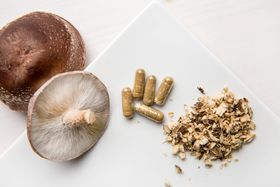9 Ways to Strengthen Your Immune System
Updated February 20, 2023.

Crafting a truly healthy immune system is not a quick process that can be achieved by singular changes to your lifestyle. Instead, there are many factors that need to work concurrently to strengthen your immune system holistically. Even small lifestyle changes can improve or weaken aspects of your immune system.
This article will cover the factors that affect the immune system and how you can start making the necessary changes to create a healthy immune system overall.
What Affects the Immune System?
Although there are dozens of things that can potentially harm your immune system, the most common ones are:
- Sleep quality and amount
- Diet
- Stress
- Hygiene
- Alcohol and nicotine
- Sedentary behaviour
9 Cost-Free Immune-Boosting Techniques You Can Implement Now
All of these immune-boosting techniques involve absolutely no extra cost (some can even save you money) and can be implemented immediately.
1. Exercise regularly
The benefits that come from regular exercise could fill an entire article of their own. Exercise is known to promote physical health as well as mental health.
Extensive research has been performed on this topic that would take hours to review and evaluate. If you'd like a place to start, here is a study that deduced moderate exercise exerted a protective effect on the immune system. You don't need to spend multiple hours every day, but even regular walking or light aerobics can benefit the immune system.
2. Get enough sleep
Sleep is essential for immune health. This is when most of the body's rest-and-repair functions happen, which means that inadequate sleep can prevent the process of cell regeneration. There is evident research to back this up. As noted by the linked study, "Disorganization or loss of the sleep-wake system is accompanied by alteration of the immunological, neuroendocrine and thermal functions of the body, and contributes to pathological processes such as infectious disease."
Essentially, inadequate sleep duration and quality can increase your chances of catching diseases. If you are unsure of how much sleep you need, follow these guidelines of the recommended sleeping times on average by age:
- Aged 65+: 7-8 hours
- Adulthood: 7-9 hours
- Teenagers: 8-10 hours
- Young children: 10-13 hours
- Babies: 12-17 hours
3. Try and reduce stress
Although this point is far easier said than done, reducing levels of stress is paramount in creating a healthy immune system. Excessive amounts of stress (as well as other mood-related disorders like depression and anxiety) can be so harmful to the immune system that they can increase your chances of developing cancer, as noted by this study.
4. Eat less junk food
Eating foods high in saturated fats and sugar can result in an elevated risk of chronic diseases like obesity, type 2 diabetes, and cardiovascular disease. All of these diseases typically result in higher production and build-up of inflammation and oxidative stress. It is commonly understood that elevated levels of inflammation and oxidative stress can weaken the immune response capabilities.
5. Eat more fruits and vegetables
Fruits and vegetables are immune system booster foods as they contain many immune-boosting vitamins and minerals such as zinc, and vitamins A, C, and E.
Additionally, many fruits and vegetables are rich in antioxidants.
6. Drink less alcohol
The adverse effects of alcohol on the immune system are rarely disputed. Research suggests that excessive alcohol consumption can disrupt immune pathways and inhibit tissue regeneration. Additionally, alcohol interferes with the immune system's ability to resist the growth and progression of cancer.
7. Smoke fewer cigarettes
It is no surprise that smoking can have dire effects on health. However, it might still be a shock just how negatively smoking can affect the immune system. Tobacco smoke can cause the following side effects, as noted by this study:
- Direct reduction in all types of immune cells
- Increased rate of infection after exposure to HIV
- Decreased amounts of disease-specific antibodies
- Increased inflammation
8. Get more vitamin D
According to research, vitamin D can modulate innate and adaptive immune responses, and obtaining more vitamin D is as simple as eating more eggs and spending more time in the sunlight.
9. Drink more water
As simple as this may sound, staying hydrated is essential as your body uses water (in the form of blood) to carry oxygen to your cells. Additionally, water helps filter out and dilute toxins in your body that could harm the immune system.
Other Ways to Boost Your Immune System
If you've exhausted the cost-free benefits of boosting your immune system or can't manage to incorporate them all, there might still be some other avenues you can pursue. For example, some vitamin and mineral supplements, as well as teas and other drinks, claim to boost the immune system. Although there might be some truth to these claims, they still will never be as effective as living a healthy lifestyle.
Additionally, there are various natural remedies that could contribute to a healthy immune system. The benefits of medicinal mushrooms for the immune system are widely known, as is the relationship between the endocannabinoid system and the immune system. As such, considering purchasing immune drops from Cannabotech in order to utilise powerful blends of functional mushrooms and CBD to forge a supercharged immune system.
What Are the Signs of a Weak Immune System?
As a final thought, you should know how to identify a weak or compromised immune system to understand how much effort you might need to put in to boost yours. Some common symptoms of a weak immune system are:
- You're always sick Although this might seem like a no-brainer, it's not uncommon to catch illnesses often and not attribute it to a suppressed immune system. Frequent and persistent colds can easily be blamed on allergies.
- You suffer from frequent gastrointestinal problems Researchers believe that diarrhoea and upset stomach can be symptoms of a compromised immune system.
- You heal slowly Minor scrapes and cuts should take around a week to heal. If they take longer, you might have a weakened immune system.
- You're always tired If your immune system is compromised, your body will have to expend more energy to make it function well enough to fight off bacteria.
If any of these symptoms become severe, such as catching pneumonia multiple times the same year, it could be a sign that you should see a doctor as soon as possible.







